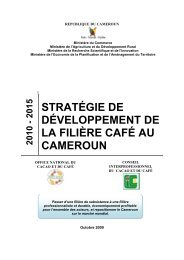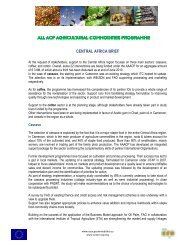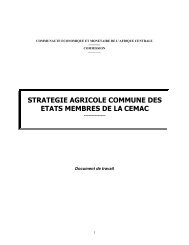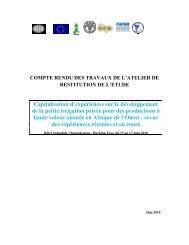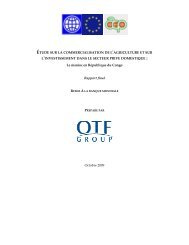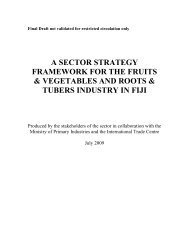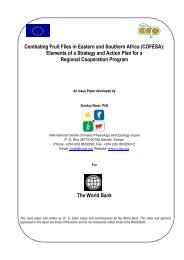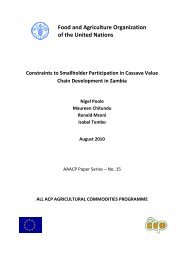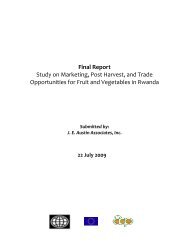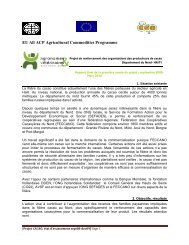Organization and Performance of Cotton Sectors in Africa ... - infoDev
Organization and Performance of Cotton Sectors in Africa ... - infoDev
Organization and Performance of Cotton Sectors in Africa ... - infoDev
You also want an ePaper? Increase the reach of your titles
YUMPU automatically turns print PDFs into web optimized ePapers that Google loves.
expansion for an attractive seed cotton price. As has been seen with newentry <strong>in</strong> both Zimbabwe <strong>and</strong> Zambia <strong>in</strong> recent years, such sectors can becontestable, which should provide an <strong>in</strong>centive to <strong>in</strong>cumbent firms to keeppay<strong>in</strong>g attractive prices to producers. However, if they cease to cont<strong>in</strong>uepay<strong>in</strong>g attractive prices <strong>and</strong> other firms enter, the change <strong>in</strong> sectoral structurebr<strong>in</strong>gs challenges as well as advantages.Failures <strong>in</strong> the market for seasonal f<strong>in</strong>ance (<strong>and</strong> hence <strong>in</strong>put access) <strong>and</strong>quality control mean that competitive sectors have had to look to governmentagencies to play an active role that goes beyond the provision <strong>of</strong> conventionalpublic goods. This exp<strong>and</strong>ed role raises the potential for government failure—<strong>and</strong>, <strong>in</strong>deed, government agencies <strong>in</strong> both Tanzania <strong>and</strong> Ug<strong>and</strong>a (classifiedhere as a hybrid system but with a large number <strong>of</strong> private g<strong>in</strong>n<strong>in</strong>g companies)have faced such challenges. Thus, the development <strong>of</strong> mechanisms by whichother stakeholders can hold government agencies accountable for their actionsbecomes critical to overall sector performance.The regulatory challenge is arguably greatest <strong>in</strong> the local monopoly system,where theory predicts that performance will be enhanced by the sett<strong>in</strong>g<strong>and</strong> impartial implementation <strong>of</strong> transparent rules for concession allocation,periodic performance evaluation, <strong>and</strong> reallocation. This is a tall ordereven <strong>in</strong> a developed economy, let alone an <strong>Africa</strong>n economy with much lessexperience at government capacity build<strong>in</strong>g. However, there may be strongpressures for a local monopoly system from cotton companies that are skeptical<strong>of</strong> their ability to make a market-based system work. In addition, thefact that a local monopoly system has a legal foundation may give it a degree<strong>of</strong> stability.A range <strong>of</strong> variants is possible on the basic local monopoly model. Specifically,decisions about pric<strong>in</strong>g may be made at a central level (through some sectorwideprice-sett<strong>in</strong>g mechanism, as currently happens <strong>in</strong> Burk<strong>in</strong>a Faso <strong>and</strong>Mozambique) or a decentralized, that is, concession, level. This arrangementmay also be true <strong>of</strong> other decisions. As with hybrid systems, the performance<strong>of</strong> a local monopoly is likely to be heavily <strong>in</strong>fluenced by the detailed rules <strong>of</strong> thegame govern<strong>in</strong>g such decision mak<strong>in</strong>g.The past history <strong>of</strong> national monopoly systems suggests that one <strong>of</strong> thebiggest challenges is how to prevent politicians from meddl<strong>in</strong>g <strong>in</strong> sector governance.Cameroon shows that this prevention can be accomplished (albeitperhaps <strong>in</strong> special circumstances), while experiences <strong>in</strong> Burk<strong>in</strong>a Faso <strong>and</strong>Tanzania show that this challenge is not conf<strong>in</strong>ed to national monopoly systems.One <strong>of</strong> the ma<strong>in</strong> justifications for <strong>in</strong>tervention by politicians is to ensurethat producers receive a fair price for their seed cotton. However, history isreplete with cases where political <strong>in</strong>tervention achieved the opposite outcome(a recent example be<strong>in</strong>g Mali from 1994 to 2002). Another key challenge fac<strong>in</strong>gnational monopoly systems, therefore, is how to ensure that farmers’<strong>in</strong>terests are safeguarded, <strong>in</strong> particular that company operat<strong>in</strong>g costs are keptunder control so that attractive prices can be paid to producers.A TYPOLOGY OF AFRICAN COTTON SECTORS 53



